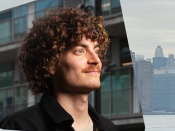Por Megan Peters (Center for the Neurobiology of Learning and Memory, University of California Irvine).
Our brains have remarkable capacities: they can discover statistical regularities and use them to drive adaptive, goal-directed behavior; they can monitor themselves (know when they are doing a good job, know when they need to update their own models of the environment and of their own predictions and processes); and they can allow us to use this uncertainty monitoring to effectively update our internal models of the environment. Importantly, brains (at least my brain) are also consciously aware! How is this possible, and what is the relationship among these capacities? In this talk, I will discuss ongoing work tackling some early, initial steps at approaching these questions — not only by undertaking the empirical research itself, but also by designing philosophically and meta-science motivated quantitative research programs to best make meaningful progress.
Bio: I am an Associate Professor in the UCI Department of Cognitive Sciences. I’m also a Fellow in the UCI Center for the Neurobiology of Learning and Memory, and a Fellow in the Canadian Institute for Advanced Research Brain Mind & Consciousness program. I am also President and Chairperson of the Board of Directors at Neuromatch, and Chairperson of the Neuromatch Academy Board Committee. Prior to joining UCI I was on the faculty at UC Riverside in the Department of Bioengineering. I received my Ph.D. in computational cognitive neuroscience (psychology) from UCLA, having worked with Ladan Shams, and then was a postdoc there working with Hakwan Lau. My research aims to reveal how the brain represents and uses uncertainty, and performs adaptive computations based on noisy, incomplete information. I specifically focus on how these abilities support metacognitive evaluations of the quality of (mostly perceptual) decisions, and how these processes might relate to phenomenology and conscious awareness. I use neuroimaging, computational modeling, machine learning and neural stimulation techniques to study these topics.
Transmissão via Zoom.


















